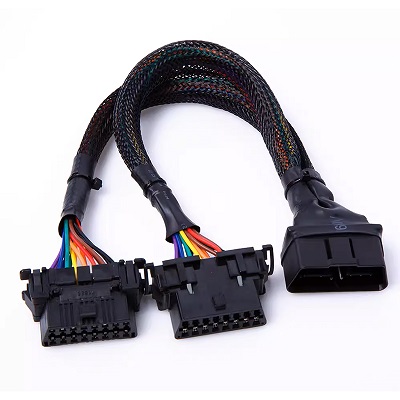
The role of OBD one-two cable:
If the OBD interface has been occupied by other devices, it CAN be used to separate two interfaces and read CAN data without interference. The line itself cannot read and send data if the electronic devices connected to the two interfaces both send data to the car bus computer, it is not supported. If the electronic devices connected to the two interfaces, one takes power and the other reads CAN data, they can be used at the same time. If the electronic devices connected to the two interfaces cannot simultaneously detect the car fault code, one of them can be detected separately.
Which are the products to read the data of the master control computer?
Such products are involved in these functions: vehicle diagnostic testing, water temperature, speed, speed battery voltage, and various car total control driving computer data.
Product model | OBD extension cable/harness |
Voltage rating | 300V AC/DC max |
Temperature range | 80℃ |
UL product number | 1007 |
Length | 30CM |
Insulating material | PVC |
Conductor | Tinned copper |
Packaging & Shipp | |
Packaging | PE bag per pcs Customized packaging is available |
Carton size | 40cm*30cm*25 cm. Customized carton is available |
Shipping by air | 2-7days |
Shipping by vessel | 10-25days depend on the port of destination |
Logistics and transportation | sea transportation/air transportation/land transportation |
Payment method | TT |
Minimum order quantity | 200pcs |
Delivery time | 15~25D |
Supply capacity/month | 50000PCS |
OBD extension cable, also known as OBD extension cable, is mainly used to connect the vehicle's OBD interface (on-board diagnostic system interface) with external devices. Its main functions include:
Convenient operation: By extending the position of the OBD interface to a more convenient location, the OBD extension cable allows users to more conveniently use OBD scanning tools or other related equipment for vehicle fault diagnosis and data collection.
Extended interface range: For vehicles with OBD interface positions that are difficult to access, OBD extension cables can greatly expand the range of interface usage, eliminating the need for users to perform complex operations in narrow spaces.
Protecting the original interface: Frequent direct connection and disconnection of OBD interfaces may cause interface wear or damage. The use of OBD extension cables can reduce direct operations on the original interface, thus providing a certain level of protection.
It should be noted that when selecting and using OBD extension cables, it should be ensured that they have good compatibility and quality to ensure the stability and security of data transmission. At the same time, relevant regulations and precautions should be followed during operation to avoid equipment damage or personnel injury caused by improper operation.
Overall, OBD extension cables play an important role in fields such as automotive maintenance, diagnosis, and data collection, improving operational convenience and efficiency.
Key features of an OBD extension cable may include:
1. Length: OBD extension cables come in various lengths to provide flexibility in accessing the OBD-II port from different positions within the vehicle. Common lengths include 1, 3, 6, and 10 feet.
2. Compatibility: The extension cable should be compatible with the OBD-II port standard used in the vehicle, typically a 16-pin connector.
3. Connector types: The extension cable typically features male and female OBD-II connectors, allowing it to plug into the vehicle's OBD-II port and accept standard OBD-II diagnostic tools or devices on the other end.
4. Wiring: The cable should be constructed with high-quality wiring and shielding to ensure reliable data transmission and protection against electromagnetic interference (EMI).
5. Durability: OBD extension cables should be designed to withstand the rigors of automotive environments, including temperature variations, vibration, and exposure to chemicals and fluids.
6. Locking mechanism: Some extension cables may feature locking mechanisms to ensure a secure connection between the cable and the vehicle's OBD-II port.
When choosing an OBD extension cable, it's important to consider the specific needs of your diagnostic setup, including the desired length and any compatibility requirements with diagnostic tools or devices. Additionally, ensure that the cable meets quality standards to ensure reliable performance and data integrity during diagnostic procedures.